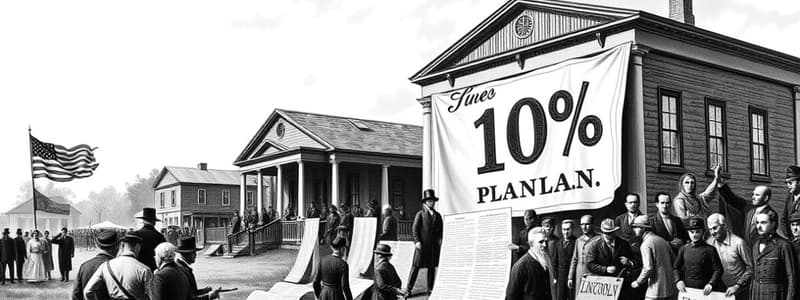Podcast
Questions and Answers
Who is in charge of wartime reconstruction?
Who is in charge of wartime reconstruction?
Both the president and congress
What was Lincoln's 10% plan?
What was Lincoln's 10% plan?
- A plan to restore the union without penalties for confederates (correct)
- A plan to guarantee rights for ex-slaves
- A plan to penalize confederates
- A plan requiring 50% of whites to take an oath
What did slaves do after being freed?
What did slaves do after being freed?
Many ex-slaves equated land with freedom and had to return to the plantations.
What was the Freedmen's Bureau responsible for?
What was the Freedmen's Bureau responsible for?
What was the significance of the Black Codes?
What was the significance of the Black Codes?
Congress enacted and overridden a veto for the first time in history.
Congress enacted and overridden a veto for the first time in history.
What reforms did the Congressional Radical Reconstruction introduce?
What reforms did the Congressional Radical Reconstruction introduce?
What does the Tenure of Office Act require?
What does the Tenure of Office Act require?
What happened to Johnson after his impeachment?
What happened to Johnson after his impeachment?
What was sharecropping?
What was sharecropping?
What did the Redeemers aim to achieve?
What did the Redeemers aim to achieve?
Who founded the KKK?
Who founded the KKK?
The 15th amendment angered women.
The 15th amendment angered women.
What was the main outcome of the Reconstruction debate?
What was the main outcome of the Reconstruction debate?
Flashcards are hidden until you start studying
Study Notes
Wartime Reconstruction Leadership
- Both the president and Congress hold authority over the wartime reconstruction efforts.
Lincoln's 10% Plan
- Proposed that the South never truly left the Union, maintaining presidential control.
- Aimed to restore the Union with no penalties for the Confederates and minimal guarantees for ex-slaves; required only an oath of loyalty from 10% of white voters.
Wade-Davis Plan
- Required 50% of white males in a state to take an oath for readmission to the Union.
- Excluded Confederates from political participation.
- Guaranteed equal rights for freed slaves.
Post-Emancipation Actions of Freed Slaves
- Many ex-slaves associated land ownership with freedom; Radical Republicans supported this idea but challenged property rights.
- A significant number were compelled to return to plantation work.
Freedmen's Bureau
- Established to distribute confiscated lands, resettle ex-slaves, and provide education, legal assistance, and job opportunities.
- Its success led to increased hostility among Southern whites.
Presidential Reconstruction under Andrew Johnson
- Johnson faced a lack of political support after Lincoln's assassination and attempted to return land to white Southerners to gain favor.
- Resulted in Southern states forming their own governments.
Black Codes
- Southern states enacted Black Codes to restrict ex-slaves’ rights, denying them the ability to serve on juries or testify against whites.
Congressional Override of Presidential Veto
- Marked the first instance in U.S. history of Congress enacting measures against a president's veto regarding reconstruction efforts.
Congressional Radical Reconstruction
- Introduced the 14th Amendment, establishing citizenship and equal protection under the law.
- The Reconstruction Act divided the South into five military districts and allowed black voting while approving the 14th Amendment.
Tenure of Office Act
- Required Senate approval for the removal of officials, a critical factor in Andrew Johnson’s impeachment.
Post-Impeachment Scenario
- Johnson survived impeachment but lost much of his political influence.
Reconstruction Debate Outcomes
- Empowered black rights, leading to the election of two black senators and the 15th Amendment granting black male suffrage.
Scalawags
- Southern individuals who supported the new constitution and aligned politically with the Republicans for cultural integration and future opportunity.
Redeemers
- White Southern Democrats aiming to restore pre-war power dynamics, viewed as “redeeming” the South from perceived Northern domination.
Carpetbaggers
- Northerners who migrated to the South to exploit its weakened economy, often seen as opportunists.
Republican Control in Reconstruction
- Republicans pushed for investments in infrastructure, hospitals, and education, promoting civil rights and economic recovery in the South.
- Overall, reconstruction efforts had seen positive developments.
Formation of the KKK
- Emerged as a reaction to the increased black presence and Republican policies, characterized by violent opposition from angry white men.
- Democrats often supported KKK activities, aiming to restore white supremacy.
Founder of the KKK
- Nathan Bedford Forrest recognized as the initial figurehead of the Ku Klux Klan.
15th Amendment and Women's Rights
- Sparked resentment among women’s suffrage advocates who felt sidelined; fueled the evolution of the women’s rights movement seeking voting rights.
Sharecropping System
- Families worked land for a portion of crops instead of wages, perpetuating a cycle resembling slavery due to lack of financial independence.
Decline of Reconstruction Efforts
- President Grant favored southern investment rather than strict government oversight, leading to skepticism among Northern Republicans about the effectiveness of reconstruction.
Studying That Suits You
Use AI to generate personalized quizzes and flashcards to suit your learning preferences.



